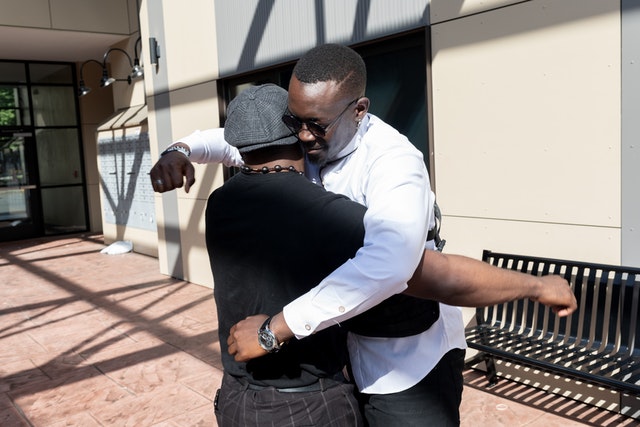2 Corinthians 4:13-5:1 NRSV
13 But just as we have the same spirit of faith that is in accordance with scripture–“I believed, and so I spoke” –we also believe, and so we speak, 14 because we know that the one who raised the Lord Jesus will raise us also with Jesus and will bring us with you into his presence. 15 Yes, everything is for your sake, so that grace, as it extends to more and more people, may increase thanksgiving, to the glory of God. 16 So we do not lose heart. Even though our outer nature is wasting away, our inner nature is being renewed day by day.
17 For this slight momentary affliction is preparing us for an eternal weight of glory beyond all measure, 18 because we look not at what can be seen but at what cannot be seen; for what can be seen is temporary, but what cannot be seen is eternal.
5:1 For we know that if the earthly tent we live in is destroyed, we have a building from God, a house not made with hands, eternal in the heavens.
Background
2 Corinthians is a letter written to the church in Corinth. Throughout the first and second books of this series, Paul urges the people to strive for unity and “oneness of mind.” Earlier in this chapter, Paul reminds the people that they have “this treasure in clay jars,” so that it may be made clear that the power belongs to God. Power “does not come from us.” In your own devotional period, read the chapter in its entirety with a particular emphasis on verses 8-10. How does these verses resonate for you?
Today’s lesson will focus on the difference (and overlaps) between slight inconveniences and oppression. Read the scripture out loud together. What’s happening during this passage?
There are many seemingly unrelated ideas in the passage for today. Paul reminds the people:
- Words can become actions, and this is a scriptural idea. “I believed and so I spoke.”
- The resurrection power is not just for Jesus. It will also be extended to us.
- Everything is for the sake of God, to the glory of God.
- We do not “lose heart.” Even though we are temporary creatures, our “inner nature is being renewed day by day.”
Moreover, Paul reminds people that the smaller afflictions are what prepare us for the glory to come. Just because we cannot see It (whatever It is) does not mean It does not exist. Paul echoes the promises of Jesus; that someday we will have a building from God. A house “not made with hands, eternal in the heavens.”
What are slight inconveniences?
We all experience frustrations. They’re a part of life. Traffic, body pain, unexpected expenses, homesickness. To live in this world is to experience a range of human emotions. As long as we live and love, we are vulnerable. It’s one thing to get stuck in traffic on your way to work; it’s another for the traffic to be because a highway project is cutting through your neighborhood. It’s one thing to have expected pain from your regular jobs; it’s another to have chronic pain and have doctors ignore it. There’s a difference between having an unexpected expense come up and having to deal with identity theft. There’s a difference between missing your childhood home because you moved across the country and missing your home because you’ve been forcefully evicted by the occupying military.
Oppression is a pattern of these inconveniences, often targeted towards certain groups and enacted by other groups that hold more power. For example, part of interviewing for a job is the potential to be denied. But when a Black person applies for a job, the entire interviewing staff is White, and the application is thrown out because the applicant’s name “is too ethnic” or features HBCU degrees, this is oppression. It is a targeted pattern of harassment just based on your identity. It’s hard to outsmart oppression.
Slight inconveniences are what we can prepare for. We can learn to do what Paul asks us to do.
- Do not lose heart.
- Remember that our bodies are wasting away, but our inner nature is being renewed.
- Believe that the “slight momentary affliction” is helping us to be ready for the future glory.
- Keep in mind that we will have a building from God, eternal in the heavens.
Who is this message for?
Words of encouragement like these can be really inspiring… and they can be dangerous. Have you ever heard that phrase, “people can be so heavenly minded that they ain’t no earthly good?” Sometimes we spend all our energy believing that “one day” things will be better, and we let opportunities for action go by.
But this message is specifically for people who are going through tough times today. It helps to have an encouraging word that reminds you that there is something after this. At our lowest points, it can be easy to give up because we don’t see the point.
We need a motivating word! We are deserving of more than what we have now. There WILL be something after this.
What questions do you still have of this scripture? How will you commit to journeying with this text this week?
 Connection to Today’s World
Connection to Today’s World
In 2018, Aiman Abdul- Jalil was the final runner in the half-marathon in Atlanta. During the 13.1-mile run, she got a note that warned her pace was too slow. So slow, in fact, that the finish line would likely close before she got there. This would have been dangerous because that also meant medical assistance would not be available to her. She began to doubt herself. But to keep going, she thought about her running group, Black Girls Run. She began to think about conversations she had with people who both doubted and believed in her.
In her own words, she reflected, “I had given myself a really hard time — ‘Oh, my God, what if I’m the last person?’ — and now it’s something that I would do again. You don’t have to fit X mold to be great and to be celebrated. It’s validating.”
When we are challenging ourselves, we can think back to the affirmations we have received in our community. We can remind ourselves of our goals and press forward in a way that is sustainable. We don’t have to push ourselves beyond human limitations, but we also shouldn’t give up when the finish line awaits us.
Journal: What is your wildest dream? What do you have to do today to get there?
Closing: Listen to “Up Above My Head,” sung by Sister Rosetta Tharpe
Up above my head
(Up above my head)
I hear music in the air
(I hear music in the air)
And I really do believe
(Yeah) I really do believe
There’s a Heaven somewhere
(There’s a Heaven somewhere)
Prayer:
Dear God,
You are the God of time. You understand and see what we cannot. You create and revise what we could never imagine.
We lean on your infinite wisdom. We know that we can’t see the whole story, but you do. Help us to surrender when it is prudent, and to push forward when it is wise.
We are ready to run the race you have for us. You will never leave us alone at the finish line.
In Jesus’ name we pray, Amen.
WORKS CITED
https://www.cnn.com/2018/11/04/health/marathon-runners-last-place-profile/index.html





